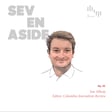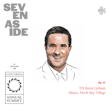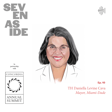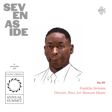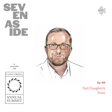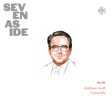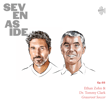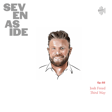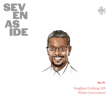Become a Creator today!Start creating today - Share your story with the world!
Start for free
00:00:00
00:00:01

Michael Berkowitz
The Executive Director of the Climate Resilience Institute at University of Miami on forging a new sustainability paradigm, the resiliency movement in this political moment, football stadia and progressive urbanism, Greater Miami as "an experiment in governance" and what makes a great mayor tick
Transcript
Introduction to Michael Berkowitz and 100 Resilient Cities
00:00:11
Speaker
Few are so closely associated with contemporary urbanism as Michael Berkowitz. The once Deputy Commissioner of Emergency Management for York City a rose to particular prominence with his 100 Resilient Cities, a first-of-its-kind imperative within Rockefeller Foundation aimed at systems reinvention and capacity building in and among urban jurisdictions and their leadership cohorts across the globe.
00:00:30
Speaker
Among its hallmarks is the chief resiliency officer, nowadays standard issue in city halls.
Miami's Resilience Efforts and the Role of the Climate Resilience Institute
00:00:35
Speaker
Greater Miami, one of 100RC's early and formative partners, is now home to another groundbreaking endeavor with Global Scope that builds on the blueprint, University of Miami's Climate Resilience Institute.
00:00:46
Speaker
Leading it is none other than Berkowitz, who chaired the Institute's inaugural Resilience 365 conference in March, helping set the tone for Miami's Ascendant Climate Week. In this continuation of our spotlight on Miami for football in the global city, Michael sits with us to discuss CRI and the university forging a new paradigm, the state of the resiliency movement in this political moment, the resiliency dividend as an offset to cascading risks, what makes a great mayor tick, and what lies ahead for the 365 conference.
00:01:14
Speaker
As well, we touch on football stadia like InterMiami's Freedom Park as expressions of progressive urbanism.
00:01:23
Speaker
Bring us up to speed, if you would, and start wherever you like. How how did the Resilience Institute, your your Miami tenure, and the and Resilience 365 conference itself come about? Yeah, so the Resilience Institute was really a vision of the former president of the University of Miami, um and ah Julio Frank, who's now the chancellor at UCLA.
00:01:48
Speaker
And his vision was to have, he he saw climate action broadly and climate resilience specifically as a very interdisciplinary pursuit.
00:02:03
Speaker
And he saw the schools and colleges at the University of Miami operating like schools and colleges do all over the world, and that is in silos.
Interdisciplinary Challenges and Strategic Roles in Resilience
00:02:15
Speaker
And so he proposed to create what he was calling at the time the Climate Resilience Academy, sort of after the national academies as an interstitial thing that would connect all of the work that happens at the school around climate resilience, at the university around climate resilience, um both in education as well as in research.
00:02:39
Speaker
And so that was where that thing came to be. And since we've renamed it the Climate Resilience Institute, because that has, I think, a little bit more currency in the academic world, people know what an institute is.
00:02:53
Speaker
um But our mission in many ways hasn't changed. It is to connect the work across 12 schools and colleges, across architecture, engineering, business, marine and atmospheric science, school communications,
00:03:07
Speaker
um in interdisciplinary ways, in ways that you know might have happened in an ad hoc manner before where you know one researcher at the School of Architecture another at the Rosensteil School of Marine Atmospheric Science might have met and collaborated, but this is trying to do that in more intentional ways.
00:03:29
Speaker
And the other mission, so that's an intramural mission of connecting um the the work internally to the university. But the other mission of the Institute is to connect that to the communities on the front lines of climate change that need it most.
00:03:44
Speaker
So to make it more applied. And so those are really our two missions going forward. And this has been a three-year endeavor. I'm two years into it. The, um,
00:03:56
Speaker
Academy was announced on Earth Day just about three years ago 2022. and two thousand and twenty two And then they went out and did a national search and eventually found me.
00:04:10
Speaker
And I started in August of 2023. two thousand and twenty three So coming up on my two year anniversary. And the conference, so and we've done other convenings before that.
00:04:24
Speaker
before that um These convenings are tools that we have really to and fulfill the second mission that I talked about, to connect the innovation at the university to communities on the front lines of climate change, practitioners, government, NGOs, civil society, all those folks, to connect them to the folks who are doing meaningful innovation at the university. And so the conference, as you saw, really tried to mix, you scholars faculty even students with practitioners like chief resilience officers and heads of sewer and water departments and you know the big NGOs that are working with communities all of those getting together to understand both what the state of play is in terms of innovation so making sure innovation that's here now can find a applied home but also
00:05:22
Speaker
better inform what we need to innovate on going forward. And with the interdisciplinary nature of the Institute, um have you in your tenure thus far, have you found that to be ah manifesting in practice and not just in in philosophy?
00:05:40
Speaker
me hey There are real reasons why universities are somewhat siloed and that is because we put necessarily and I think appropriately a premium on smart people going very deep in a particular field and coming out with answers and pushing that the the state of play of that field forward.
00:06:09
Speaker
I have found interdisciplinary action to be harder than I think I thought it would be. And, you know, I came from, you know, my background, I was at New York City government, which is a, you siloed enterprise. then I spent about a decade at Deutsche Bank, a massive, you know, global bank that is also siloed in many ways.
00:06:31
Speaker
um But, you know, the siloing at universities is real and tricky. um And, you know and sometimes necessary and appropriate.
00:06:42
Speaker
um I've found that the research side of the enterprise has been easier to de-silo because the scientists and the faculty and the researchers really just want to work together. They there's, and you know, until recently there has been ah lot of support and, um, incentive to do that trans, cross-disciplinary work.
00:07:10
Speaker
Um, On the education side, the way degrees are conferred um and the way in which students are referred to courses and tuition follow the students, all of those are strong incentives for disciplinary action.
00:07:29
Speaker
And so the educational side, I would say, has been, would look, you know, a year and a half in to be an even harder challenge. and It's not to say we're not working on it and there's lots of support at the and at the university. We run an interdisciplinary resilience course for undergraduates. We're doing a lot of work to try to cross pollinate some of the graduate level courses, but I would say the inertia of um disciplinary thought is stronger on the educational side than it is on the research side.
00:08:02
Speaker
but As you're talking, I'm i'm reminded of the the so ah CRO role and what you ah emphasized. The CRO role is is so important because it's not dealing with putting out the fires on a daily basis. It can think holistically and strategically. It has that that luxury. um And it and it so that takes me to Miami-Dade, which occupies a special place
The Resilience Dividend and Governance Experiments
00:08:25
Speaker
in the legacy and growth of your 100 resilient cities. think think it was labeled a ah quote unquote unique partnership.
00:08:34
Speaker
how How did that relationship carry through to your work now? Yeah. I mean, one other thing about the CRO before i I talk about Miami Dade, I think you're you're absolutely right that um the thing about resilience is and you know fragility for that matter, which is the opposite of resilience, is that it tends to have cascading impacts across different systems during disaster.
00:09:03
Speaker
um And so, you know, communities are fragile because they have poor socioeconomic status and they, you know, don't have a lot of backup or they are living in isolation where neighbors don't know one another or they have transportation, know,
00:09:27
Speaker
poverty where they have to commute long distances to work on fragile transportation systems or their infrastructure or their natural environments are not up to the challenges of today let alone you know what the challenges that will be posed by climate change in the future so all those are compounding risk factors across different systems and so in that way it challenges us to be interdisciplinary, to understand that risk, not just from a transportation planner or a housing advocate or, you know, a biologist working on biodiversity and natural systems or economic development um person.
00:10:10
Speaker
It's to understand the compounding risk factors across all of those systems. That's the challenge. That was why the and CRO was so um powerful a kind of position and an idea.
00:10:22
Speaker
And the other side of that, of course, is that what we call the resilience dividend, you can have one intervention, like improving greenery in inner cities, or re, know, converting interior schoolyards from concrete to natural features, or transportation intervention like bike lanes or the underlying that you know, you see in which repurposes derelict space in Miami.
00:10:51
Speaker
Any of those things can also strengthen communities. This is the flip side of fragility and compounding risk. Any of those interventions can strengthen communities across multiple systems.
00:11:05
Speaker
You improve access to natural environment and healthy and accessible transportation and you give families and neighbors a place to recreate and meet all of those things together strengthen multiple systems and create a kind of holistic resilience you know this is what we call the resilience dividend not just one benefit reduce you know your you enhance greenery or ah green transportation system say that you know reduces
00:11:38
Speaker
the urban heat island and captures flood water, but also provides all these other benefits to strengthen communities, give time to recreate, improve public health.
00:11:52
Speaker
If you do it right, you might have economic benefits, all of these different kinds of things. And that's what we call the resilience dividend. So that's why this interdisciplinary work, both at the university through the institute, but also, you know, at this, you know, city or county level through a CRO is so important.
00:12:08
Speaker
So Miami Dade was, it was greater Miami and the beaches. It was in many ways, a um the partnership with a hundred resilient cities was experiment in governance.
00:12:22
Speaker
You had three administrative jurisdictions, the county, the city of Miami and the city of Miami beach. And they all worked collectively together on a single strategy.
00:12:37
Speaker
um that looked at you know what are the thing the core components that the region would need to do in order to strengthen results. And so that was unique. We tried it in some ways in the Bay Area, and in San Francisco, in California, with San Francisco, Oakland, and Berkeley, but each of those did individual strategies. And this was the first time we tried to get jurisdictions together working on collective strategy.
00:13:05
Speaker
and that product, both the strategy, but really the
00:13:13
Speaker
ah effort, the coalition of folks who came together, which was, which is called Resilient 305, that still um persists today.
00:13:25
Speaker
And it's, I think, arguably stronger now than it ever has been. and so Having you know those, and and there's a research collaborative formed between largely between UM and f FIU, the Florida instance ah International University, um that is measuring the outcomes and success of that.
00:13:48
Speaker
And there are lots of different actors at a variety of organizations that are a part of it. And this group is about to embark on a, you know, i updating and a redoing of the stra a strategic elements that were first laid out five years ago, almost six years ago, as a part of Resilient 305. So that's incredibly powerful to see that happening.
00:14:17
Speaker
And I think that is in part a testament to the mayor of Miami-Dade County, Danielle Olivia Cava. who has was a champion of that work when she was a county commissioner when it was first happening, and then continued to take up the mantle and support it going forward. And there's, you know, the mayors of my the city of Miami and Miami Beach and and many other folks around the region have also um been important supporters.
00:14:48
Speaker
The other thing is that when you live in a place that is so obviously threatened by natural disasters, a kind of, you know, and often referred to as ground zero of the climate crisis.
00:15:02
Speaker
um
Leadership and Bipartisanship in Resilience Efforts
00:15:05
Speaker
You never have to make the argument of why resilience is important. You're always reminded whether it's an incredibly hot summer with marine heat waves in 2023, a very active hurricane season,
00:15:20
Speaker
um you you know, rain rainfall and, you know, inland flooding, like, we're always being reminded of the need to do resilience.
00:15:35
Speaker
And so that's been a very important aspect, i think, of why this coalition has stayed together across party and party lines and political persuasion um You know, in ah in a variety of diaspora communities that are here at different economic levels, people generally understand the importance of building resilience now. And so that is a very powerful place to be when you're trying to promote that.
00:16:07
Speaker
Yeah. And, you know, you were, well, you you've touched on a couple of things that I'd like to unpack. You know, you you were at the conference effusive in your praise for from Mayor Levine Cava. You said, enjoy her while you while you have her.
00:16:21
Speaker
um she She, of course, helped kick off the conference. You have worked with urban leadership all around the world. um Is there something in particular about ah the mayor's style and approach to governance that for you stands apart?
00:16:35
Speaker
Yeah, I think it's her, you know, it's her history and experience. You know, she started Catalyst Miami, which is a large and important nonprofit in South Florida from her kitchen 30 some odd years ago.
00:16:58
Speaker
um and she worked as a county commissioner and and in a variety of roles. And then, you know, as mayor, And I think all of that experience serves her well to understand that she's not just changing she's not just chasing the next shiny object, but rather she needs to provide sustained leadership guidance and support.
00:17:27
Speaker
And so that I think is what to me sets her apart. We see incredibly powerful, eloquent, charismatic mayors around the world um who have, you know, at one time or another embraced resilience. I mean, I was there for a lot of them because each time ah we inducted a new city into the hundred resilient cities, the mayors were there and we did joint press conferences.
00:17:58
Speaker
um But there are many fewer of them actually had the staying power and the focus and attention to continue to drive that agenda forward.
00:18:10
Speaker
And the changes that we're talking about to make communities less fragile and more resilient are generational struggles. They're not things that you can get done in a couple of years or even in one four-year term.
00:18:23
Speaker
Hopefully you can have some wins. Hopefully you can make some progress and have some exemplar things that show people what good looks like. But to really change how vulnerable and exposed South Florida is from say coastal storms and hurricanes or heat or, know, rainfall flooding in order to really change that, that's going to be a generational thing. It's going to need to change the, you know, we need to continue to improve the economy and the infrastructure and the green and continue to restore the Everglades.
00:18:57
Speaker
All of those things need to happen. um in order for us to you know really move the needle on resilience. And there's a lot of interesting work that's happening here, but we got we we need to continue to give it time.
00:19:10
Speaker
And that's why I think the mayor, Levine Cava, is so um special, is because she has that point of view and will continue to support that work going forward.
00:19:26
Speaker
The other thing you touch on is something that is kind of a distillation of the resilient cities ethos and and proposition. And um that is a post ideological worldview and approach. and you know, with cities and city leadership rightly or wrongly in the crosshairs of our national political discourse, um how does the resiliency mantra um help reframe or recenter the conversation around systems reinvention, the transformation that you're talking about, progress and and opportunity? How does it, does i I guess, defang, if you will, political rhetoric?
00:20:04
Speaker
I think because what we're talking about is making communities stronger and better able to survive disasters and uncertainty. and that tends to be a pretty bipartisan issue.
00:20:24
Speaker
um And, you know, in many ways, it's important that we know that the earth is getting warmer and the seas are getting higher.
00:20:36
Speaker
And, you know, the rain will likely be more and the storms when they happen will likely be bigger. So understanding yeah what your future risk profile is, is going to be important.
00:20:54
Speaker
But the
00:20:58
Speaker
core controversial, such that it is, tenet, that humans are causing and continue to exacerbate climate change is less important in the resilience world.
00:21:12
Speaker
Because what we're focusing on is how to build stronger, more equitable, sustainable, and ultimately resilient communities.
Private Sector Involvement and Innovation in Resilience
00:21:23
Speaker
And that is working yeah across systems, leveraging new kinds of finance, capturing value and benefit, and measuring those values and benefits and monetizing those values and benefits in different ways.
00:21:38
Speaker
All of those things are what resilience practitioners are working on. And those tend not to be so controversial. And they're even less controversial in a place like Florida that is the subject of frequent shocks and stresses.
00:21:53
Speaker
So it's not academic. You know, there's no, you can't, there's not a lot of misinformation. Everybody in South Florida understands the importance of this enterprise.
00:22:05
Speaker
And that makes this a very powerful place to think about innovating and doing that work. um Well, you mentioned monetization and and one of your stated goals for Resilience 365 is to to help ah drive private sector investment in areas like cleantech. And you had actually a ah pretty strong roster of companies, cleantech, defense tech, so forth at the conference.
00:22:28
Speaker
Given what's happened at the federal level, even in the days since ah the convening, um do you remain bullish on that proposition? How do you see things unfolding that on that front?
00:22:39
Speaker
Yeah, I think, know, there's no question that the lack of funding from the federal level is going to provide some headwinds to this sector.
00:22:51
Speaker
um But some of the innovation that needs to happen is to figure out better ways to monetize the values we get out of, say, public infrastructure.
00:23:03
Speaker
um And so I'll give you an example. We are working on a hybrid reef that has a concrete structure underneath is actually the one that we're working on looks like a bean hive it's called sea hive um that is trying to dissipate wave energy you can think about it as a breakwater you know 100 or 200 meters offshore and then we're layering over that hybrid corals that are heat tolerant so
00:23:37
Speaker
bred to withstand marine heat waves in new ways. And one is just figuring out what the value of having better breakwaters offshore are.
00:23:50
Speaker
And that cost benefit is looks pretty good in South Florida, where between Miami-Dade and Broward County, you have, you know, miles and miles of extremely valuable coastlines.
00:24:05
Speaker
And so just from a storms and protection perspective, um we need to find new structures. This might involve working with insurance so that if you have those structures out there, you get you know breaks in your insurance and that's a way of kind of paying for them. We need to find new ways to monetize the value of this, which we know exists. And there's pretty good research out there right now.
00:24:33
Speaker
about you know all all of the value that smart breakwaters, in this case, hybrid reefs, provide to valuable coastlines like Miami and Broward County.
00:24:44
Speaker
But we also need to capture the benefit of the corals and the ecosystem services, increased marine life and fisheries and tourism and all the things that come with a healthy ocean.
00:25:03
Speaker
We need to also monetize that part. And once we figure out how to do that, then we will never have to worry about who's in the White House and what the state of federal funding is because the market will do that.
00:25:19
Speaker
And that's the innovation that we need to do now. um And, you know, looking on the bright side of what could be a very dark situation, um you know, the lack of federal funding and support may force innovation in some of these market mechanisms that will have repercussions and benefits for years to come.
00:25:42
Speaker
There's been such a boom of private real estate development. I mean, that's sort of stating the obvious. um Has that sector in particular been engaged on this in creative ways?
00:25:53
Speaker
there There has been such an opportunity, low hanging fruit opportunity, to build in South Florida. And that value proposition has been so strong that the need to innovate hasn't been quite as prevalent there.
00:26:09
Speaker
um And so i do think that, you know, continuing to engage developers, um you know, throughout this process, ah you know, both developers of high end, know, real estate and more affordable developers to help you know, understand how their business ah proposition manifests itself and what some of the pain points they're experiencing would help us innovate both new kinds of materials and designs, but also um financial mechanisms that would build resilience and make that, you know, into those
00:26:54
Speaker
developments and make that a ah more sustainable business proposition. my I guess my follow-up to some of this is you know with with academia in the political crosshairs as well, um how ambitiously do you feel you can pursue your your agenda? um And is the university you know i fully embracing this, or is there a little bit of a tightrope walk here?
00:27:20
Speaker
I think that we have a duty to continue to ah pursue the agenda. I don't think on the resilience side, um it's like I explained, i don't think it's that controversial of an agenda.
00:27:37
Speaker
um And so, i mean, we need to continue to acknowledge that waters are going to warm, seas are going to rise. heat waves will become more prolonged and severe. or you know, in in the case of South Florida, it's not even a heat wave as much as it is a heat season.
00:27:57
Speaker
The things that we're working on and innovating are important, regardless of where you come down specifically around, you know, climate change.
Academia and Media's Role in Promoting Resilience
00:28:08
Speaker
And so i think that should um at least partially inoculate us against some of the criticisms and um you know rhetoric and and action that's happening now.
00:28:24
Speaker
um But we're in extraordinary time, so who knows? um I also think that there is um there could be a moment where we have a massive disaster, unlike anything we've ever seen before.
00:28:39
Speaker
And that will... also change the rhetoric in different ways and so we need to be ready to make the most of that disaster it will be tragic and it will be costly but it will also focus our attention on the resilience innovation and state of play and narrative in ways that never happened before i don't know if that's going to happen this year next year or five years ten years But, you know, we will, we know that the exposure and the risk is out there.
00:29:17
Speaker
um Whether that's Miami, South Florida, you know, New York, other places. And we need to be ready to help our communities pivot in ways that really make them less fragile and more resilient.
00:29:35
Speaker
Yeah. That's, I mean, that's pretty sobering. you You would think that the LA wildfires would have been something. Right. that Right. and And they, they have been to some degree, but I also think, you know, the, they're not like, they haven't been paradigm shifting in the same way. Right.
00:29:57
Speaker
They will, l LA will 100% drive forward conversations, for instance, about about insurance and, you know, rebuilding and, know, code and all of those things. I think we will see significant innovation on the back of that.
00:30:16
Speaker
But it's not, that's not the COVID, know, of the climate resilience movement. um And if you think about that, you know, like we've been talking about remote work since the 70s.
00:30:33
Speaker
And for a variety of reasons, we haven't been able to, you know, make remote work work until, you know, early 2020, March of 2020. And in, you know, a month, everybody who could work from home, and there are lots of people who couldn't, but everyone who could was working from home and it has fundamentally reshaped the nature of work forevermore.
00:31:00
Speaker
And the the question is what's going to be the climate resilience movements, COVID, and will we be ready to take advantage of Well, pivoting just slightly, um something we're quite focused on and and um usually flies a little bit under the radar is is the media and information economy as it relates to pretty much everything we're we're talking about here. Sustainability, dynamism, civic and democratic health.
00:31:29
Speaker
um Mayor Levine Cava made mental health a focus of her second term. U.S. Conference of Mayors cites it as a top priority as well. um Knight and Miami Foundations are working jointly to shore up local journalism.
00:31:45
Speaker
ah Even New York City Mayor mayor Adams, to to his credit, has gone so far as to label social media a public health hazard. um How do you you see the media information but economy factoring in the resiliency equation at all?
00:32:02
Speaker
One of the things about resilience is how we understand risk. And understanding risk is a tricky thing. Understanding personal risk, say from smoking cigarettes or from not wearing wearing your seatbelt is one thing.
00:32:23
Speaker
and understanding, you know, multi-scale risk over, you know, multi but bold multi-geographic scale and multi-time scale from climate change.
00:32:35
Speaker
is a whole different question. It's um arguably a much harder risk to internalize. and And so you have that at the same time as to your point, we're seeing the disaggregation of authoritative voices.
00:32:52
Speaker
We no longer have Walter Cronkite. We're starting to lose a variety you know of our authoritative media sources and people. If you look at something like the Edelman Trust Barometer,
00:33:04
Speaker
people are starting to trust and get their information from a whole bunch of non-traditional um sources and like peers. So and I saw the 2023 Edelman study that basically ranked scientists and peers as the two most authoritative voices around the critical scientific issues of the day.
00:33:25
Speaker
And that's unbelievable, right? It's either someone who spent their life studying this thing and has a PhD or your friend Joe, who you got a couple of peers with. And what that means to me is as we think about trying to communicate risk and resilience, we need to start to integrate new voices and you know both messages and messengers um in ways that you know are fit for purpose for 2025 and beyond.
00:33:58
Speaker
And so that may mean working with influencers and you know TikTok stars and celebrities. and may also mean doing more of the old fashioned community meetings and yeah real hand to hand combat, if you will, of you know messaging.
00:34:18
Speaker
um And it may mean things like augmented and virtual reality. All of those things are going to be how we better understand our risk. But you know if you look at and people's behavior, building in risky places, continuing to disregard the trove of peer reviewed and scientific data about you know the state of the climate and where it's going.
00:34:47
Speaker
yeah Clearly, we have our work cut out for us. And that's going to manifest itself in different ways. I'm not just trying to get people to you know stop eating meat and drive out your cars or you know bicycle everywhere or whatever.
00:35:00
Speaker
It's also about, you know, where you buy your next house and how likely you are to think about insurance and all of those other factors that make more resilient communities and less fragile.
00:35:16
Speaker
do Do you, do you, do you feel like cities in particular have a responsibility to promote the more, I guess, traditional, um journalistic outlets as trusted sources of information um and and help figure out the the you know the the sort of collaborative, the the the the model the for sustainability?
00:35:39
Speaker
I don't know if cities have that responsibility necessarily. um
00:35:48
Speaker
ah i certainly want to do that as an individual. And I think society is better off with, you know, intermediaries who are in sober and rational and fair ways interpreting events and giving us context.
00:36:12
Speaker
But I appreciate that that's an incredibly um difficult and nuanced thing to do to understand how we get more of that um in society today, it may be ah case where it's too late to get the genie back in the bottle.
00:36:31
Speaker
And, and from my perspective as a resilience practitioner, I want to be conscious of the realities of the ways in which, you know, when the hurricanes were threatening Florida last year, my son went to TikTok and to Instagram.
00:36:48
Speaker
And that's how we found out and wasn't, you know, national weather service people or even, know, the weather underground. It was who people I would call kids, but you we're older than him he's 18 so and but that's how he understood the risk, and so I want to be conscious of the reality of the way users people communities are.
Community Engagement through Sports Venues and Urban Challenges
00:37:15
Speaker
ah consuming information and I want to think about new ways to work with those people. And to bring it back to the University of Miami, we're a famous university for lots of influencers, right? And um one of the things that myself and Dean at the School Communications have been talking about is how we, you know, how could we harness some of that for, um you know, messaging around issues of risk and resilience?
00:37:45
Speaker
And i think that yeah know if we if we can do that, what better place to study that also than in Florida, where you have this incredible diversity of multiple um yeah political viewpoints. you have red, blue, purple.
00:38:00
Speaker
You have diaspora communities from across mostly Latin America and the Caribbean. um You have incredible income distributions. um and and other diversity factors and so wouldn't it be and you have at the same time all of this opportunity because you have multiple climate shocks and stresses that we're experiencing so what better place to learn about how to best communicate this kind of risk and these kind of resilience measures in south florida
00:38:38
Speaker
Miami has has a gem of a stadium coming online in Freedom Park and the master plan for 2026. ah You yourself lived in London.
00:38:49
Speaker
near Emirates, if I'm not mistaken, for a stretch of time. i Stadiums in cities around the world are are being expanded. They're being retrofitted and if not built from the ground up in compliance with entirely new standards.
00:39:03
Speaker
How do you see sports venues and football stadium in particular as expressions or manifestations of a broader mandate and blueprint? I think the, I mean, it will come as no surprise. I'm an urbanist and I believe in the power of urban development.
00:39:19
Speaker
um building cities, building an urban renewal um and making, yeah know, and i and I think sports has a, you know, is a really powerful expression of that.
00:39:35
Speaker
And, you know, you see the way in which when it works and there are of course examples of where, you know, the opposite is true, but the way in which sports brings us together across all of these different race, class,
00:39:50
Speaker
socioeconomic status, all these things, sports tends to bind us in really powerful and important ways. And it promotes, you know, healthy um and engaged communities many times. So um the stadium part of that, the built infrastructure, i think, you know, where you have stadiums in the middle of cities um that are accessible by public transit, where, you know, they're like part of the communities um that that they represent. I think those are really great
00:40:30
Speaker
um examples of what, know, the power of that that stadiums can can provide. And, you know, in Miami, it's like um the Orange Bowl was in Little Havana.
00:40:47
Speaker
And everybody in Miami talks about the power of the arms bowl in Little Havana. Like right in the middle of the community. um There's actually the Marlin Stadium, what's called Lone Depot Stadium is is basically on that spot now.
00:41:01
Speaker
um And people talk about, like that is people's memories of going to Little Havana and all the parking that was on people's lawns and interacting with the community and all of that, like, you know, was like an amazing amazing experience.
00:41:15
Speaker
And I think we lose that when we put stadiums too far at the periphery. um And, you know, I mean, Emirates is a good example of that, is is a good example of something that was is continues to be in the community in North London. and um And they could have put it further out or, you know, um when they moved it from Highgate.
00:41:36
Speaker
But all the best football stadiums, yourre your you know, soccer football stadiums in Europe, are all, most of them are in the communities.
00:41:48
Speaker
um And that I think is incredibly powerful. Like where Fulham plays, Craven Cottage in South London is like, you know, the best example of that. It's like right in the middle of of of everything that's going on there. And I think that's where, you know, stadiums have such an opportunity to be powerful community building and resilience building um levers.
00:42:14
Speaker
So in in the in the time we have left, you know were we're delightfully in the throes of another election cycle in New York City. I i can't imagine you don't keep close tabs on things here. ah Where has the city made its greatest strides of late but in in the resiliency, um yeah on the resiliency front? and And what would you most like to see the next administration zero in on or or accelerate? i Well, so i think the congestion pricing is without a doubt and we're you know just past the first hundred days of congestion pricing and all of the data that's coming out uh about the first hundred days um is incredibly it's heartening and inspiring and hopefully we can keep that going um you know going forward so um i think that's been the most important
00:43:11
Speaker
thing that that has happened. um And the reason for that is, you know, you get fewer cars, better street usage, you know, more people on foot in central business districts, it's better for small business.
00:43:30
Speaker
I just saw a stat that said 17% fewer complaints about horns and noise complaints. So that's great across, you know, we know that noise is incredibly debilitating.
00:43:44
Speaker
It has poor, you know, they're poor cognitive and educational outcomes for kids. It's bad for mental health. There's a whole bunch of reasons why and that's important. So I think, you know, and other than just generating revenue for the subway,
00:43:59
Speaker
um I think the congestion pricing is a really important step and and hopefully we can, you know, solidify it and keep it. um So that I would say is the most important thing that's happened so far.
00:44:15
Speaker
ah Going forward, I mean, I think the housing crisis, finding ways to build more affordable housing um so that people, know, so that we address homeless, some of the homeless issues,
00:44:29
Speaker
crisis, but also allow you lower and you know lower income and even middle class people to live with dignity in the city, I think is going to be important for the next mayor.
00:44:44
Speaker
How to do that is incredibly tricky, as you know, because you know government intervention in something that is largely a private enterprise backfires. you know often backfires And so actually think it's, you know, there one place to look might be in Florida where ah live local campaign, which incentivizes developers building affordable housing um might be one policy inspiration to look for. It's actually a policy from a Republican government
00:45:24
Speaker
um And it is largely private sector focused, but it takes away um some of the regulation, and some of the regulatory friction, I would say, um if you you know commit to building more affordable housing.
00:45:40
Speaker
um And so I don't think that's the panacea. It's not the only way to address the issue. I think concessions from developers for building more affordable units is one thing and um continuing to think about how to ease some of the regulatory friction in New York in other ways might be another way to think about it, I think.
00:46:00
Speaker
um But finding ways to build more affordable housing units and get people in there and do that in equitable ways and ways that don't just... ah solidify and cement existing advantages and yeah that certain communities have. So um I think that, and by that, I really mean,
00:46:23
Speaker
you know too often, I think um you know things like rent control just benefit the folks who can find those and hold on to those apartments.
00:46:34
Speaker
And they don't necessarily alleviate the core issues. You know, it just makes building affordable housing harder and less attractive if you're a developer. And, you know, there are studies that indicate it's certainly a mixed picture, if not a negative picture with overall addressing the kinds of issues you're trying to address.
00:46:58
Speaker
And so i that that to me, someone, a mayor who is focused significantly, not singularly, because, you know, it's a huge city, it's got lots of issues, but someone who's focused on the housing issue and maybe thinking about ways to build in the resilience dividend with that.
00:47:15
Speaker
Think about, know, green, think about reducing urban heat island, um all of these issues while you're building units. I think that would be the role of a really progressive housing, know, commissioner of housing preservation development.
Resilience 365 Conference: Bridging Academia and Practice
00:47:34
Speaker
um and or CRO or yeah deputy mayor at city hall, depending on how they they want to work that, but that might be the thing I would focus on if I were the mayor.
00:47:48
Speaker
So lastly, what's next for the Resiliency 365 conference? Where does it go from here? Brazil's 365, I would say, i mean, that's an important lever.
00:47:58
Speaker
it was ah know an important conference. We'll definitely do another one in March of 2026. And we hope people will come. um And, you know, our goal there is to connect. Again, it's to connect academia.
00:48:15
Speaker
and you know the practitioner class, and but also to connect the work that's happening in South Florida with the work that's happening you know in the rest of the world.
00:48:26
Speaker
And so we'll continue to use those as design principles um and continue to drive that work forward. So I think you know there's lots of, we have big wicked challenges here in South Florida,
00:48:44
Speaker
But we also have so much interest and energy and innovation and solutioning that's going on here. We should also share that back out. So we need both to be inspired and to inspire.
00:48:55
Speaker
And hopefully, you know, a regular annual conference called Resilience 365 can build on the success of you this year's conference and and and pivot it going forward into the future.
00:49:09
Speaker
Stay tuned for more on Miami and other global cities in the run-up to FIFA World Cup 2026. With special thanks to our guest Michael Berkowitz, I'm Evan Howell for KIT Magazine and Studio Santiago.


